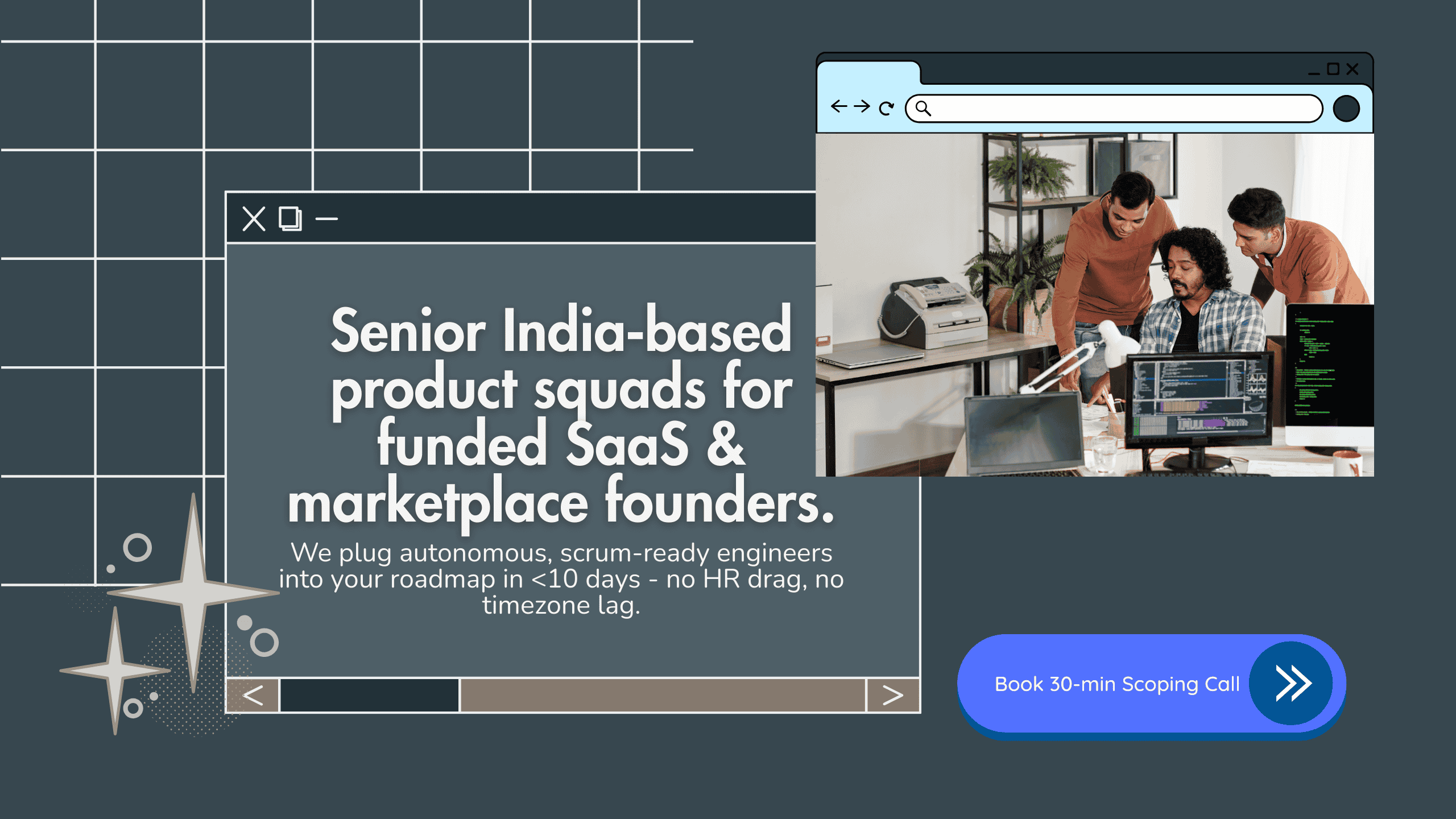What Should We Look for in a Software Development Partner to Ensure Long-Term Success?
Picking a software development partner is crucial. Learn what makes the difference between a short-term vendor and a long-term ally.

When we started 1985, we knew the expectations businesses had from a software development partner. But the truth is, after years in this game, we've learned that what sets successful partnerships apart goes beyond technical prowess. It’s about vision, it’s about culture, and sometimes, it’s just about having the right vibe. Let’s dig into the key things to look for if you want a long-term win—not just for your business, but for your sanity.

1.Beyond Features and Bugs
A good developer writes code. A great partner understands your business.
It may sound like a cliche, but alignment is where long-term success begins. Think of a time when your development partner asked you, "Why do you need this feature?" That simple question reflects their deeper interest in your business goals. You want a partner who cares about your objectives and can adapt their solutions accordingly. The right software development partner must do more than just "ship the code." They should understand why you're building the thing you’re building.
Consider hiring a partner that says, "Tell us what to build, and we'll build it." Sounds good, right? Wrong. You need someone to challenge you, to add nuance to the vision, and to tell you, sometimes bluntly, if you're headed off course. The software development partner is not just a builder; they are your co-pilot.
Look for partners who ask you about your market. They should want to know who your competitors are, how your monetization works, and what your growth aspirations are. If they don’t ask these questions early, that's a red flag. If their focus is on features and timelines without the context of the broader picture, expect misalignment to bite back later.
A great partner will ask why at every step. Not to be difficult, but to ensure that everything they develop moves the needle for you. They'll help you prioritize features based on their impact on your business. They'll know when to suggest a quick fix to get a product in front of customers and when to advise a longer investment in scalability for future growth. It's a strategic partnership, not a transactional one.

2. Technical Proficiency
Specialists are great. But versatility rules in a fast-changing industry.
You need a partner with the right mix of technical skills. Sure, there are plenty of developers who are experts at, say, JavaScript frameworks like React or Node.js. But in the real world, your project’s needs are fluid. What starts with a web app might evolve into a mobile-first platform or expand into cloud-native deployments. Your partner should be versatile—like a Swiss Army knife that can bring out the right tool at the right moment.
Tech Stack Matters, But Approach Matters More. Often, businesses make the mistake of emphasizing proficiency in a particular stack. Here’s an important insight: languages and frameworks change. They evolve, they get replaced. Remember Flash? Exactly. What remains crucial is the partner’s approach to learning and adapting. How quickly do they respond to the industry's shifts? Do they have a culture of internal learning?
Ask them about technologies that are no longer relevant. How did they handle the transition when AngularJS phased out? Their answer will tell you a lot. You want a partner that’s not emotionally tied to any stack and one that can keep up with your product’s evolving needs.
And, while we’re here, let's touch on code quality. No one talks about code quality until you have to scale, then suddenly, it’s all you can talk about. Look for partners who can explain their approach to testing, version control, and refactoring. Their answer should make you comfortable that they build for both today and tomorrow.

3. Be Clear, Regular, and Brutally Honest
Communication breaks projects more than tech ever will.
If you ask me what’s more critical—being able to write flawless code or being able to convey clearly why a feature will take two extra weeks—the latter wins every single time. You’re not just buying technical labor. You’re buying peace of mind.
Your development partner should communicate proactively. If they wait until you ask, “Why haven’t we seen an update in a week?”—there’s already a problem. You want a partner who isn’t afraid of hard conversations. Ones who can tell you, “We’re behind,” or “This feature is more complex than we anticipated.” Honesty is a sign of respect for you as a partner.
Effective communication isn’t just about status updates. It’s about understanding nuance. If you ever feel like your partner is merely responding to what you say, rather than digging deeper, you’re dealing with a vendor, not a partner. It’s subtle, but it makes all the difference over the long term.
Cultural Compatibility Matters
And while we’re at it, communication extends beyond status updates and technical clarifications—it involves cultural compatibility. If the team you're working with doesn't understand the culture of your target market or your internal working style, it can create unnecessary friction. Cultural differences are not about geography alone; it's about aligning expectations on responsiveness, understanding the urgency, and even recognizing when it’s appropriate to push back.

4. Scalability in Every Sense- Teams, Code, and Relationships
You’re not just building software- you’re building a future.
Scalability isn't only about whether the code can handle a million users. It's also about the team itself. Can they grow with you? What happens if your MVP becomes a raging success, and you need more hands on deck in a matter of weeks? Does your development partner have the bandwidth, or will they struggle to keep up?
The best partners are the ones who see a step ahead. They develop with growth in mind, making sure you’re not boxed in by the limitations of today’s choices. For instance, if you’re a startup in a rapid growth phase, your development partner should suggest architectural decisions that support future load increases. Not over-engineering, but future-proofing smartly.
Scalable Relationships Are Built on Trust
And let’s not overlook the importance of a scalable relationship. If the relationship is built solely on technical terms—milestones, deliverables, and payments—you're only thinking in the short term. A truly scalable partnership will involve regular strategy check-ins, suggestions beyond what's in the contract, and an interest in your growth story beyond coding.
A great partner takes pride in your success. They’ll push you toward better ways of doing things—even if it means questioning decisions you hold dear. This isn’t about ego; it’s about wanting what’s best for you.

5. Maintenance, Support, and Adaptability
Shipping the code isn’t the end—it’s barely the beginning.
Every software development company will tell you about their expertise in creating products. Fewer will talk about maintaining those products. Even fewer will commit to being around for the long haul.
When the launch adrenaline fades, that’s when you see the true colors of your development partner. How quickly do they respond when there’s a critical bug in production? Are they proactive in monitoring performance, or do they wait for you to sound the alarm? You need a partner who understands that long-term success doesn’t come from simply delivering version 1.0. It comes from continuous iteration, from understanding how users interact with the product and adapting accordingly.
Adaptability: The X Factor in Long-Term Relationships
Your needs will change. The market will shift. Technology will evolve. When it does, you need a partner who is flexible and adaptable. How willing are they to pivot when your strategic goals change? The best partners don’t see changes as setbacks—they see them as natural evolutions. Look for partners with that mindset.
Adaptability also extends to pricing. For example, at 1985, we’ve often modified our engagement models for clients who've moved from fixed scope to ongoing retainers because their needs changed. A partner invested in your long-term success will be flexible enough to adapt how they work with you as those needs evolve.

6. Domain Expertise vs. Fresh Perspective
Domain knowledge is valuable, but so is an outside perspective.
If you’re in fintech, hiring a development partner with experience in that space is almost always a good idea. But there’s nuance here. You don't just want someone who understands compliance or financial systems integration. You want someone who also questions industry norms.
Sometimes, the best innovations come from cross-pollination. A development team with experience in consumer apps might bring fresh thinking to an enterprise problem. Don't underestimate the value of diversity in experience. When a partner questions why something is always done a certain way, that’s often where breakthroughs happen.
Ask prospective partners about their experience in your industry, but also ask how they’ve applied what they learned across industries. It’s the kind of nuanced conversation that reveals how they think, not just what they know.

7. Transparency
All development projects are messy. The best partners are open about it.
Software development is rarely a linear journey. Things break. People make mistakes. Deadlines are missed. The worst thing your partner can do is hide that from you. If everything always seems perfect—run.
Look for partners who believe in transparency as a core value. They should let you in on their processes, warts and all. A partner who shares early demos, conducts regular sprint reviews, and even lets you peek into their bug tracking system is a partner who trusts you. More importantly, they trust the relationship enough to let you in on the mess because they know they’re committed to cleaning it up.
Metrics, Reporting, and Honesty
Transparency also means metrics. Does your partner provide you with regular reports? Do they share the number of bugs, the velocity of their team, or insights into blockers they’re facing? These metrics can be uncomfortable, but they’re the backbone of accountability.
If they sugarcoat issues or say “it’s all under control” when it’s clearly not, you’ll end up with surprises down the line—and not the good kind. Partners who tell you the hard truths upfront are the ones worth holding onto.

8. Cultural Fit
Culture eats strategy for breakfast. That’s true for your dev partner too.
We’ve talked about communication and honesty, but underpinning all of it is cultural fit. No matter how talented a team is, if they don’t fit your company culture, the partnership will struggle. Cultural fit is about shared values. If you value moving fast and breaking things, but your development partner values caution and process, you’ll clash. If your internal team thrives on humor and light-hearted banter, but your partner is all business, you’ll find collaboration draining.
Find partners who fit your work style. Ask about how they deal with tight deadlines, how they handle late-night emergencies, or what they do when things go wrong. If their answers align with how you do business, you’re in good shape.

The Unseen Benefits of the Right Partner
Finding the right software development partner takes time. It’s not about picking the cheapest bid or the one with the flashiest website. It’s about understanding the subtle qualities that lead to long-term success—qualities like adaptability, transparent communication, cultural fit, and the willingness to ask hard questions.
When you make the right choice, your partner becomes an extension of your team. They understand your business as deeply as you do. They challenge you when you’re wrong, and they celebrate with you when things go right. At 1985, we’ve seen what the power of the right partnership can do—it turns good projects into great ones and makes the development journey as rewarding as the destination.
So take your time. Ask the tough questions. Look beyond the resume. Because when you find the right partner, you're not just building software. You're building a future.



